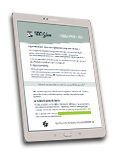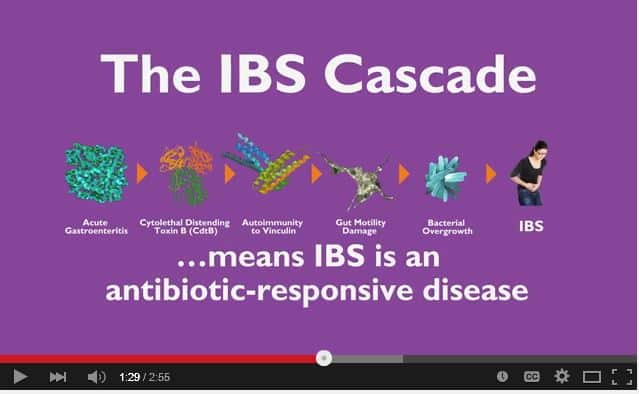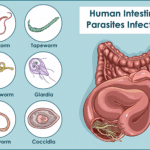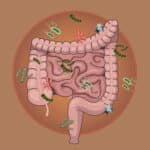Is IBS an Antibiotic Responsive Disease?
Is IBS an Antibiotic Responsive Disease?
Dr. Pimentel and his group have just launched a new blood test called “IBS (check)” that they claim identifies an IBS diagnosis and, with this new diagnostic tool, that IBS is now a disease – quote, “IBS is an antibiotic responsive disease.” Here is the announcement on You Tube:
HERE IS WHAT THEY ARE TESTING
The test looks for antibodies to the Cdt-b toxin and antibodies to vinculin. When a food poisoning event occurs, some people will get exposed to a toxin that is produced by E. coli, Salmonella, Shigella or Campylobacter, called Cdt-B toxin (Cytolethal Distending Toxin B). When exposed to this toxin – the Cdt-b toxin, people experience watery diarrhea. The antibodies produced by some people to attack the Cdt-b toxin will also attack a protein within the lining of the intestinal tract call vinculin. This creates an autoimmune reaction, where antibodies that you create are attacking self. Dr. Pimentels’ group believes that around 20% of people exposed to this toxin will go onto develop SIBO, with ongoing IBS symptoms and that this takes about three months to develop.
Here is what it looks like: There is a food poisoning event and exposure to Cdt-B toxin which triggers gastritis. 20% of people will create an antibody to the toxin. They will recover from the food poisoning event – gut symptoms will return to normal. The antibodies created to address the toxin start to attack vinculin. Over time, your gut motility slows, leading to a highly fermentable environment in the small intestine and setting the stage for SIBO and IBS symptoms that appear around the three month mark.
Vinculin is a protein that connects a network of cells within the pacemaker of the gut, called the Interstitial Cells of Cajal. The pacemaker of the gut does exactly what you think it would, it is the signaling network that signals the coordinated wave like contractions of peristalsis; it sets the pace.
Vinculin helps these cells connect and communicate electrical signals to contract your smooth muscle. If vinculin is damaged or destroyed, it can’t link the cells within the pacemaker and you then can’t transmit the electrical signal to contract your smooth muscle. This stalls gastric motility during meals and in between meals.
ON A POSITIVE NOTE
This test will identify if you have been exposed to the Cdt-b toxin and if you have produced antibodies to it. It will also identify if your body has produced antibodies to vinculin WHICH will then inhibit gut motility. This information is good to know.
You can have chronic diarrhea AND inhibited gut motility. Chronic loose, watery stool does not mean that you have ‘too much’ gut motility. What is happening is that your small intestine is being flooded with water, driving diarrhea. So, again, knowing if your gut symptoms are in part due to the damage done to vinculin, this is good to know.
This test will help distinguish between IBD (Inflammatory Bowel Disease) and IBS patients.
HERE IS MY ISSUE WITH THE CLAIM: That this is an “IBS diagnostic test”
This test will only identify a very small subset of people experiencing IBS symptoms. Only 20% of people who are exposed to a food poisoning event will produce antibodies to the Cdt-b toxin. Not everyone that has IBS symptoms, has them as a result of an autoimmune issue with vinculin antibodies.
This isn’t an IBS diagnostic test. It is a autoimmunity test, testing to see if vinculin antibody levels are present.Specifically, this test diagnoses a form of IBS called Post-Infectious IBS (SIBO).
In this short video, introducing this test to the world, Dr. Pimentel makes the claim at the 1.29 minute mark that “IBS IS AN ANTIBIOTIC RESPONSIVE DISEASE”
This is a BIG leap, going from identifying 20% of people who have produced antibodies to the Cdt-b toxin, to stating that “IBS is an antibiotic responsive disease.”
From the slide here – gut motility slows and if SIBO becomes an issue then they are labeling this as ‘IBS’ and tying the entire community of IBS patients to needing treatment with antibiotics. If gut motility is affected, inhibited, or disrupted, this will create a great level of imbalance with the gut.
The idea that 100% of people, of whom, test positive for antibodies to vinculin NEED to be place on an antibiotic is ludicrous (I know, tell you how I really feel). It will tip an already imbalanced gut, into even more imbalance. Antibiotics don’t fix gut motility disorders. They knock all micro-organisms down at once. The gut motility issue is still there and this will simply increase the ‘need’ for more rounds of antibiotics.
Now, let’s take the leap from here to say that “IBS is an antibiotic responsive disease” and you have just plain lost me. Antibiotics do not ‘cure’ SIBO or IBS. This test is going to lead to more and more overuse of antibiotics in a population that needs to work on rebalancing their gut health and reinstating gut motility.
The only way to regain balance with the gut it to look for ways to reinstate gut motility, support healthy flora balance, reduce the fermentable load in the diet and work, over time, to heal the gut.
Enjoying this content? Sign up for updates... It's FREE!



















Comments
from 12 people
Hi Kate,
The organism are more sensitive to flagyl and not to rifaxmin (in your case). If methane positive SIBO, you may have even done better on a combinations of the two antibiotics. I am SO sorry that your doctor didn't follow up with further testing, treatment, healing and a plan to help you so you didn't relapse. I hope you have found some help with this!
Warmly,
Angela
Angela Pifer
Hi Angela,
This is a great post-- slowly there will be more light shed on treating these issues.
After being initially diagnosed w/SIBO, my dr prescribed Flagyl. I felt dramatically better 3 days into this course-- could digest anything I ate (including foods I avoided for years), had lots of energy, and even brain fog and mood improved dramatically. I hadn't felt this great in years-- I felt like myself again.
My dr had not advised any maintenance treatment after the Flagyl, naturally my symptoms returned quickly. I was later prescribed Rifaximin, which had absolutely no effect.
My question is: why do you think I responded so well to the Flagyl, and not at all to Rifaximin?
I am really hoping you can provide some insight, I would appreciate any input!
kate
Hi Haleh,
Thrilled that you are finding the site informative. I am about to recorder a new series of posts. I'll make the announcement in the next few days.
Both the antibiotics and herbal antimicrobials will reduce SIBO by only so much with each round. You can expect an average reduction of 20 parts per million, if the protocol is effective. I do work with herbal antibiotics and Allimed/ Allimax and Neem Plus are among those that I use (as part of a full comprehensive protocol). It takes time (multiple rounds) to reduce SIBO microbes down to the level that we can shift gears to gut healing, replenishment/ balancing. I do get very good results working with the herbals. The goal is to retest along the way to assess the efficacy of the protocol, rotate protocols monthly AND address everything else in terms of contributing factors, nutritional imbalances, digestion, immune, diet - each person will need a different protocol to do this. JUST taking herbals or JUST taking the antibiotics will not fix SIBO.
I am about to open up for new patient appointments again. If you decide that you would like one on one support, please reach out through scheduling on my website to be added to the waiting list.
Warmly
Angela
Angela Pifer
I'm devouring your website and wish that I could get a chance to meet you. I'm currently on Xifaxin for the 2nd time and unfortunately my doctor gave me a sheet of paper that had dietary guidance, nothing too specific! I'm really afraid of what's going to happen to me once I get off my 24 day course of this antibiotics. I met with another specialist, Mellanie Keller, who also wasn't a huge help BUT she did inform me that herbal antibiotics are just as helpful, if not more than Xifaxin.
What are your thoughts on herbal antibiotics, such as Alimed with Need Plus? Do you prescribe them? Have you experience positive results?
Haleh
Another item to note here - this is a test looking at antibodies. With regards to how this test is being discussed, they are saying that a positive level of cdt-B toxin antibodies OR vinculin antibodies is a positive result and that this shows that this is a positive IBS test - what I see is that a positive vinculin antibody test is a positive autoimmune test. I would not treat this with antibiotics.
At the same time, I am concerned that doctors will run this test, get a positive result on either of the antibody levels and that they will treat with antibiotics - without running a SIBO breath test to see which 'bug' they are trying to address.
Angela
Angela Pifer | SIBO Guru
Hi Bernie, The peer reviewed published studies show that Rifaximin significantly reduces symptoms short term and not long term. It is currently being reviewed for approval for use with IBS symptoms (previously being used off label) and the study is showing that most people need two rounds AND they are only monitoring people for 4 week, 8 weeks and 14 weeks. This is a flash in the pan and does not prove that Rifaximin works long term.
I appreciate that you are feeling better and so quickly. I have my fingers crossed for you that this works!
Angela
Angela Pifer
Regardless of the details of this particular test, there is plenty of evidence in the scientific peer-reviewed literature, eg placebo controlled trials in humans, that IBS IS responsive to antibiotics (eg Rifaximin). The improvement is not always permanent, as dietary habits etc are likely to continue unchanged, however to say there is no like to gut flora is wrong.
Secondly, I speak from personal experience that Rifaximin (and other antibiotics) have a sudden dramatic positive effect on my own symptoms. I am halfway through my first course of Rifaximin right now and the effect was evident after 24 hours, even though I deliberately ate high FODMAP foods I would normally avoid.
Bernie
Hi John - thank you! I am happy to answer your question. Dr. Pimentel lectures on SIBO. In these lectures it is frequently stated that around 20% of people exposed to the CDT-B toxin will go on to produce antibodies and be at risk for developing an autoimmune condition where these antibodies also attack the protein vinculin in the gut lining.
My statement isn't that this test will only be effective 20% of the time. It is that only 20% of people exposed to food poisoning get the CDT-B toxin and antibody/ autoimmune response to vinculin. So, this 'IBS-check' is not a test for IBS. It is a test to see if a person who has had food poisoning has been exposed to the CDT-B toxin. Does this make sense?
Angela
Angela Pifer
Angela,
Its John from www.fixyourgut.com. I am a big fan of your work.
I got a quick question. Where did you get the statistic that IBSchek would only be an effective diagnosis in 20% of post infectious IBS cases.
Thank you.
John Brisson
Hi Joanne, Yes this is a blood test. It tests whether your were exposed to the Cdt-b toxin and have antibodies for this toxin and vinculin. I am sorry for what you are going through. In my practice, I find that antibiotics don't work to 'fix' SIBO.
Warmly,
Angela
Angela Pifer
Is this a blood test? I have had a hydrogen breath test which was positive for SIBO. I was on 4 rounds of antibiotics,this year alone, the last one for a month. Today, I am still so sick. :-(
Joanne